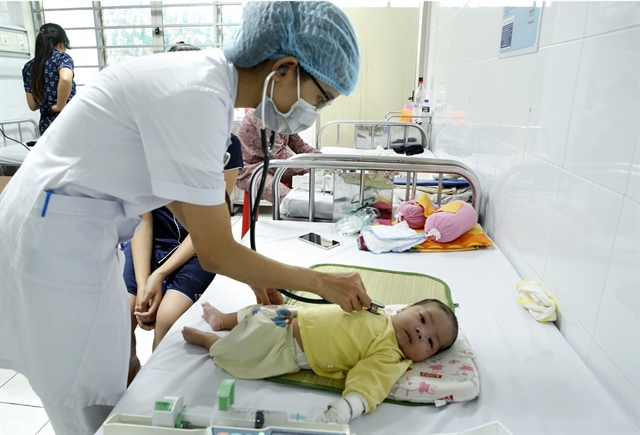 Society
Society

The Ministry of Health (MoH) has added three communicable diseases namely chickenpox, mumps and rubella into the list of infectious diseases which are capable of rapid transmission and can be fatal.

|
| A doctor examines a child suffering from measles at the Department of Infectious Diseases of Việt Nam National Children’s Hospital. .— VNA/VNS Photo Dương Ngọc |
HÀ NỘI — The Ministry of Health (MoH) has added chickenpox, mumps and rubella to the list of infectious diseases capable of rapid transmission and potentially fatal.
Under a circular which took effect from September, infectious diseases subjected to isolation include chicken pox, diphtheria, whooping cough, measles, rubella, anthrax, meningococcal meningitis, mumps and hand, foot and mouth diseases.
The move aims to prevent and limit the spread of the infectious diseases that need to be monitored and isolated.
According to Trần Đắc Phu, head of Preventive Health Department under the MoH, viruses, bacteria, hot and humid climate and poor environmental hygiene are the causes of many diseases and modes of disease transmission.
“In the past, we could control diseases that occurred in a locality, but now they can spread to other places within two hours”, he was quoted by Hà Nội Mới (New Hà Nội) newspaper as saying.
Diseases had hit mountains areas despite never appearing before, he said, adding that some common diseases which usually occur in the winter or spring had started arising in the summer.
Chicken pox is a typical example.
Many adults in Hà Nội have been infected with chicken pox this summer even though it's more common in the winter and spring among kids aged between 2 and 8, the newspaper reported.
One unnamed 22-year-old woman from Thanh Xuân District said she got chickenpox while was 15-weeks pregnant.
“My niece got chickenpox at her school. Then, my brother and sister-in-law were also affected. I am the fourth person in my family to get the disease,” she said.
The four patients received treatment at the virus and parasitology department of the National Hospital for Tropical Diseases.
The Department of Infectious Diseases of Việt Nam National Children’s Hospital has recorded many cases of transmission from children who had chicken pox to their mothers.
Nguyễn Văn Lâm, director of the department, said most chickenpox cases are benign but the disease is highly contagious and can have life-threatening complications, such as pneumonia and encephalitis.
Someone with chickenpox can spread the virus through droplets in the air by coughing or sneezing as well as contact with fluid from the blisters, making it important to monitor and isolate infected patients, avoiding spreading the disease among the community.
Along with chickenpox, rubella and mumps also have mechanisms of transmission through the respiratory tract or mucus that has viruses.
In the first months of this year, the number of rubella and mumps cases increased in some countries around the world. The US’s Center for Disease Control and Prevention has issued a warning about a hike in mumps as more than 700 cases were recorded in the country.
Hoàng Đức Hạnh, deputy director of Hà Nội’s Health Department, said conditions were ripe for a lot of epidemics from other localities to enter Hà Nội.
Preventive measures
Phu, the director of Preventive Health Department, said the ministry has learned from previous disease prevention and combat efforts.
Priority has been given to early detection of infections from international border gates and at community and health care centres.
Once a suspicious case was detected, the infected people must be isolated for immediate treatment, he said.
Nguyễn Nhật Cảm, director of Hà Nội Disease Control Centre said the city had five mobile teams for disease prevention and combat and each district had its own teams.
Upon receiving information about suspected cases of infection, the team would arrive at the scene and employ appropriate measures, he said.
The city also monitors passengers entering through Nội Bài airport, especially those coming from disease-affected areas.
To prevent the epidemic from spreading, localities should launch campaigns to raise knowledge for enterprises and people on the diseases, Cảm said.
When infections were detected among students, teachers and school employees, hygienic disinfection is a must to minimise the spread of germs, he said.
"Strict punishment will be imposed on any individuals or units who are found hiding epidemics or failing to comply with supervision measures and isolation,” Cảm said. — VNS




